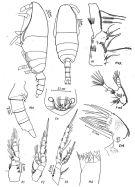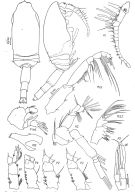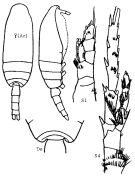|
|
 |
Fiche d'espèce de Copépode |
|
|
Calanoida ( Ordre ) |
|
|
|
Spinocalanoidea ( Superfamille ) |
|
|
|
Spinocalanidae ( Famille ) |
|
|
|
Spinocalanus ( Genre ) |
|
|
| |
Spinocalanus longispinus Brodsky, 1950 (F,M) | |
| | | | | | | Syn.: | Spinocalanus horridus (part.): Damkaer,1975 (p.37, figs.F) | | | | Ref.: | | | Brodsky, 1950 (1967) (p.132, Descr.F, figs.F); Harding, 1966 (p.29, Rem.); Vidal, 1971 a (p.18, 24, 119, figs.F,M, Rem.M); Brodsky & al., 1983 (p.274, figs.F,M, Rem.); Sirenko & al., 1996 (p.349) |  issued from : Brodsky K.A., Vyshkvartseva N.V., Kos M.S. & Markhaseva E.L. in Opred. Faune SSSR, 1983, 135. [p.275, Fig.129]. Female. Gnb = first inner lobe of Mx1; p md = palp of Md; Md: masticatory edge of Md; Gn: genital field (ventral).
|
 issued from : Brodsky K.A., Vyshkvartseva N.V., Kos M.S. & Markhaseva E.L. in Opred. Faune SSSR, 1983, 135. [p.276, Fig.130]. Male. P1-4 = swimming legs incomplete; lb = left
|
 Issued from : K.A. Brodskii in Calanoida of the Far Eastern Seas and Polar Basin of the USSR. Opred. Fauna SSSR, 1950, 35 (Israel Program for Scientific Translations, Jerusalem, 1967) [p.132, Fig.51]. Female (from Central part Arctic Ocean): habitus (dorsal and lateral right side); Do, posterior thoracic segments (dorsal); S1, P1; S4, P4. Nota: 4th and 5th thoracic segments separate, corners rounded, not produced bascward. Cephalothoras 2.33 times longer than abddomen. Genital segment slightly longer than 1.5 times the following segments, ventral process laterally rectangular, and serrate margin. Caudal rami almost as long as anal segment. 2 nd abdominal segment bearing ventral bundle of bristles. A1 longer than body by 1.5 distal segments
|
 Issued from : M. Bode, S. Laakmann, P. Kaiser, W. Hagen, H. Auel & A. Cornils in J. Plankton Res., 2017, 39 (4). [p.605, Table I]. As S. longispinus/stellatus female (from SE Atlantic). Species identified via morphological and molecular analyses, including the number of specimens used for each identification method (MI: morphological identification, COI: cytochrome c oxydase subunit I gene fragment, MS: MALDI-TOF analysis, 18 S: ribosomal 18 S gene fragment). Cryptic lineages were revealed only after molecular analysis. Sampling depth, latitude, total length (TL) and Prosome/Urosome ratio (Pr:Ur) of taxon were recorded. morphological characters are only listed here, if the identification was ambiguous due to missing body parts or if crypticf or pseudocryptic lineages were revealed during molecular analyses. For diagnostic character of species refer to the references: Park, 1970; Grice, 1971; Damkaer, 1975; Schulz, 1989, 1996. C = coxopodite; B = basipodite; P = swimming legs. Nota: This form bear morophological characteristics of both species: very conspicuous ventrolateral edges of the cephalosome (''shoulders'') and metasomal spinules on the left sidfe of the cephalosome, as described for S. longispinus Brodsky, 1950. In contrast, the spine comb on the coxa of Mxp was clearly on a protrusion, similar to descriptions of S. stellatus Brodsky, 1950.. Thes two species are currently not generally accepted and ranked among S. horridus (Worms Editorial Board, 2015) [without true demonstration. CR]. S. horridus was much more spinulose on both sides of the cephalosome and had very long spines on the basis of Mxp.
| | | | | Ref. compl.: | | | Harding, 1966 (p.17, 71); Dunbar & Harding, 1968 (p.315, 319, Rem.: p.324); Sameoto, 1984 (p.213, Table 1); Kosobokova & al., 1998 (tab.2); Kosobokova & Hirche, 2000 (p.2029, tab.2); Auel & Hagen, 2002 (p.1013, tab.2); Galbraith, 2009 (pers. comm.) | | | | NZ: | 3 | | |
|
Carte de distribution de Spinocalanus longispinus par zones géographiques
|
| | | | Loc: | | | Arct. (Fletcher's Ice Is., Laptev Sea, Lomonosov Ridge), Japan (in Furuhashi, 1966, p.306), off British Columbia (rare), N Baffin Sea | | | | N: | 11 | | | | Lg.: | | | (22) F: 2,5-2,1; (131) F: 3,2-2,28; M: 2,6-2,1; {F: 2,10-3,20; M: 2,10-2,60} | | | | Rem.: | Cette espèce est maintenue contrairement à l'opinion de Damkaer, 1975 (p.37)
Voir aussi les remarques en anglais | | | Dernière mise à jour : 27/03/2020 | |
|
|
 Toute utilisation de ce site pour une publication sera mentionnée avec la référence suivante : Toute utilisation de ce site pour une publication sera mentionnée avec la référence suivante :
Razouls C., Desreumaux N., Kouwenberg J. et de Bovée F., 2005-2025. - Biodiversité des Copépodes planctoniques marins (morphologie, répartition géographique et données biologiques). Sorbonne Université, CNRS. Disponible sur http://copepodes.obs-banyuls.fr [Accédé le 27 décembre 2025] © copyright 2005-2025 Sorbonne Université, CNRS
|
|
 |
 |






